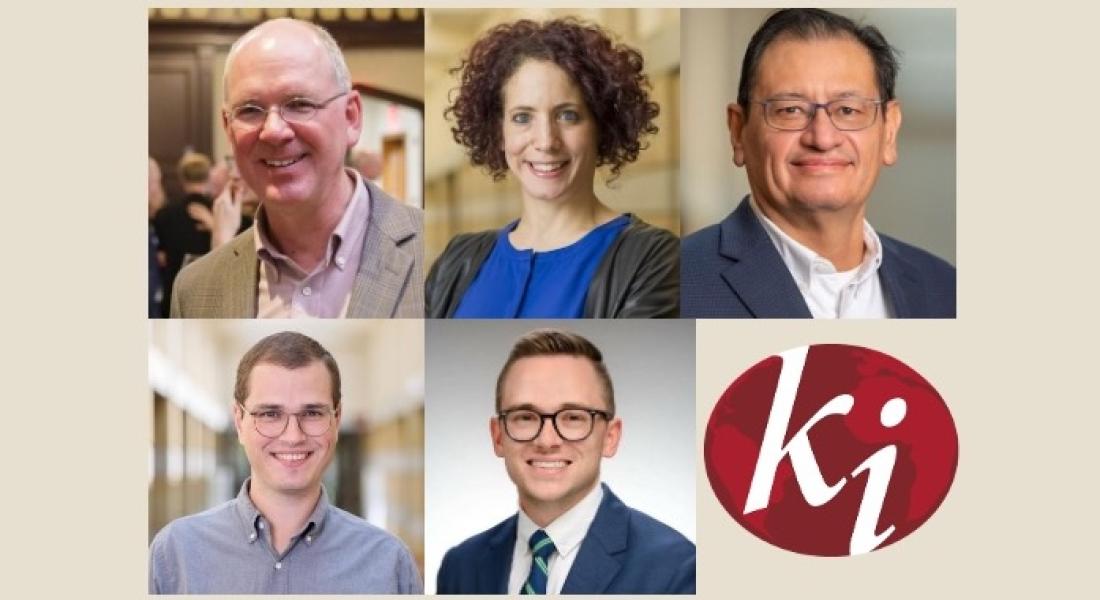
The power of artificial intelligence (AI) is changing the world, and its applications in support of democracy are the focus of a new working group, one of four set to launch this fall.
The Working Group on Computational Political Science for Democracy is led by professor of political science and Kellogg faculty fellow Michael Coppedge with Lucy Family Institute for Data & Society colleagues Dmitry Zaytsev and Valentina Kuskova. As part of a new collaboration between the two institutes, the working group focuses on how AI-enabled research can enhance the use of datasets, such as the collaborative V-Dem project spearheaded by the University of Notre Dame and now led by Coppedge and his global partners.
The workshops, seminars, and conference plans are part of a three-year vision to develop an AI-driven platform to model and monitor global democracy and its development and decline.
“We believed that there were a few other political science researchers who use related computational methods such as machine learning who would be interested in having a regular forum in which all of us could share our work in progress and give and receive feedback,” said Coppedge.
“It turns out there are more than a few! Many of our graduate students who specialize in methods, as well as some Political Science faculty, Keough faculty, and visiting fellows, are enthusiastic about having such a working group, so we are excited to get it going this fall.”
A second working group with the Lucy Family Institute on "Algorithmic Mediation and Memory" will examine how emerging AI systems, such as those based on Large Language Models (LLMs), impact historical narratives and collective memory across cultural, geographical, and religious contexts. It is led by Keough School faculty member Atalia Omer, a Kellogg faculty fellow, and Lucy colleague Nuno Moniz.
The other new Kellogg working groups are:
- The Political Economy of Development Working Group, led by Andrés Mejía Acosta, the Kuster Family Associate Dean for Policy and Practice and associate professor of global affairs in the Keough School of Global Affairs
- The Kellogg Comparative and International Politics Seminar (CIPS) Working Group, led by Keough assistant professor of democracy and global affairs Marc Jacob and Richard Clark, assistant professor of political science.
The CIPS Working Group is designed to create opportunities for visiting scholars, advanced graduate students, and postdoctoral fellows to present research and meet one-to-one with external speakers during weekly sessions.
“Our seminar addresses a gap in programming by focusing on cutting-edge comparative and international politics research from emerging scholars,” said Clark. “This helps position Kellogg as a hub for vibrant scholarly exchange and raises Notre Dame’s profile in these critical fields.”
Acosta says the Political Economy of Development Working Group offers a space to promote innovative thinking, discuss work-in-progress research, and encourage joint multidisciplinary grant proposals.
"Our group welcomes the critical thinking contributions of faculty members engaged in both classic and emerging debates on taxation, service delivery, and other state influences in governing market forces," he said.
The new groups join an impressive list of others that welcome the participation of new scholars and voices, says Saadat Musabaeva, the Kellogg Institute research program manager. The existing roster and their planned sessions for this academic year include:
- Africa Working Group – Chairs: Paul Ocobock and Ellis Adams
- Democracy, Governance, Institutions, and Rights – Chairs: Aníbal Pérez-Liñán and Kyle Jaros
- Development Economics Working Group – Chairs: Santosh Kumar Gautam and Heitor Pellegrina
- Histories of Economics and Development in the Global South – Chairs: Paul Ocobock, Ted Beatty, Nikhil Menon
- Integral Ecology (IE) Working Group – Chair: Fr. Emmanuel Katongole
- Latin American Critical Cultural Studies Working Group – Chairs: Vanesa Miseres, Maria Rosa Olivera Williams, and Magdalena López
- Latin American History Working Group – Chairs: Ted Beatty, Karen Graubart, and Jaime Pensado
- Mexico Working Group – Chair: Jaime Pensado
- Race, Gender, and Slavery in the Atlantic World – Chairs: Karen Graubart and Scott Barton
- Romero Working Group – Chairs: Todd Walatka and David Lantigua
- Comparative Politics Workshop – Organizer: Tomás Gianibelli
All Working Groups welcome new members who are interested in or conducting research on their respective subject matters. Contact information and other details on all are available on the Kellogg website here.





